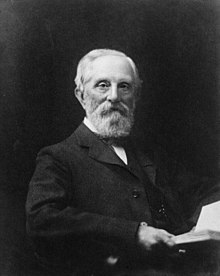John Hall (New Zealand)
|
The Honourable Sir John Hall KCMG |
|
|---|---|
 |
|
| 12th Premier of New Zealand | |
|
In office 8 October 1879 – 21 April 1882 |
|
| Monarch | Victoria |
| Governor |
Sir Hercules Robinson Sir Arthur Hamilton-Gordon |
| Preceded by | Sir George Grey (1879) |
| Succeeded by | Frederick Whitaker (1882) |
| Constituency | Selwyn |
| 4th Colonial Secretary of New Zealand | |
|
In office 20 May 1856 – 2 June 1856 |
|
| Governor | Sir Thomas Gore Browne |
| 1st Chairman of the Christchurch Town Council | |
|
In office 1862–1863 |
|
| Succeeded by | John Ollivier |
| 26th Mayor of Christchurch | |
|
In office 1906–1907 |
|
| Preceded by | Charles Gray |
| Succeeded by | George Payling |
| Personal details | |
| Born |
18 December 1824 Kingston upon Hull, England |
| Died | 25 June 1907 (aged 82) Christchurch, New Zealand |
| Political party | Independent, leaning conservative |
| Spouse(s) | Rose Dryden |
| Relations |
Mary Grigg (granddaughter) Thomas Hall (nephew) |
| Children | 5 |
| Religion | Anglican |
Sir John Hall KCMG (c.18 December 1824 – 25 June 1907) was born in Kingston upon Hull, England, the third son of George Hall, a captain in the navy. At the age of ten he was sent to school in Switzerland and his education continued in Paris and Hamburg. After returning to England and being employed by the Post Office, at the age of 27 he decided to emigrate, later becoming the 12th Prime Minister of New Zealand. He was also Mayor of Christchurch.
After reading a book on sheep farming, Hall emigrated to New Zealand, on the Samarang, arriving in Lyttelton on 31 July 1852. His brothers George and Thomas followed him to New Zealand soon after. He developed one of the first large scale sheep farming runs in Canterbury.
In 1853, he was elected to the Canterbury Provincial Council. He would later rise through the ranks of magistrate, was the first town council Chairman in Christchurch (the forerunner to the position of mayor, 1862 and 1863), and Postmaster-General. In Parliament he represented the electorates of Christchurch Country 1855–60 (resigned in early 1860), Heathcote 1866–70 & 1871–72 (resigned), Selwyn 1879–83 (resigned) & 1887–90, and Ellesmere 1890–93 (retired).
In the 1865–66 election, he contested the Heathcote electorate against G. Buckley, and they received 338 and 239 votes, respectively.
On 8 October 1879, he was appointed the Premier of New Zealand, where his ministry carried out reforms of the male suffrage (extending voting rights) and dealt with a conflict between settlers and Māori at Parihaka, although poor health caused him to resign the position less than three years later. In the 1882 Birthday Honours, he was appointed a Knight Commander of the Order of St Michael and St George.
...
Wikipedia
